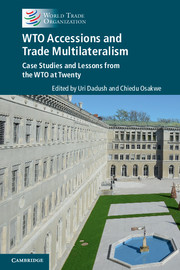Book contents
- Frontmatter
- Dedication
- Contents
- List of contributors
- Foreword
- Acknowledgements
- List of abbreviations
- Editors' note
- PART I WTO accessions, the trading system and the global economy
- PART II Overview: systemic outcomes from accessions
- PART III Members’ perspectives on accession negotiations
- PART IV Working party chairpersons’ perspectives on accession negotiations
- 25 Facilitating accessions: the role of the working party chairperson
- 26 A podium perspective: experiences and challenges of chairing a working party
- 27 Are there different rules for least-developed countries in a rule-based system?
- 28 Managing the challenge of acceding post-conflict states
- PART V Salient features inWTOAccession Protocols
- PART VI Conclusion
- Annex: Contributor biographies
- Index
- Plate section
28 - Managing the challenge of acceding post-conflict states
from PART IV - Working party chairpersons’ perspectives on accession negotiations
Published online by Cambridge University Press: 05 November 2015
- Frontmatter
- Dedication
- Contents
- List of contributors
- Foreword
- Acknowledgements
- List of abbreviations
- Editors' note
- PART I WTO accessions, the trading system and the global economy
- PART II Overview: systemic outcomes from accessions
- PART III Members’ perspectives on accession negotiations
- PART IV Working party chairpersons’ perspectives on accession negotiations
- 25 Facilitating accessions: the role of the working party chairperson
- 26 A podium perspective: experiences and challenges of chairing a working party
- 27 Are there different rules for least-developed countries in a rule-based system?
- 28 Managing the challenge of acceding post-conflict states
- PART V Salient features inWTOAccession Protocols
- PART VI Conclusion
- Annex: Contributor biographies
- Index
- Plate section
Summary
ABSTRACT
This chapter posits that leaving WTO accession in the hands of trade experts or commercial specialists within the acceding government can be unwise. Accession to the WTO goes far beyond the remit of the trade, commerce and/or foreign ministry, and even beyond the responsibilities of the minister. In order to conclude an accession, what is required of the acceding government will involve many, if not most, ministries, call upon governmental agencies and other authorities and may very well include both regional and municipal levels of government. The acceding government must expect to make hard policy choices. Poorer developing countries are likely to come across particular challenges and solutions. Given the demanding nature of this process, it is important that the acceding government is entirely convinced, before embarking upon the process, that it has the right motivations and expectations in wishing to become a member of the WTO.
Why join the WTO? This is the key question about which acceding governments need to have a clear idea and to which they need to respond in no uncertain way. It not only determines why the government has applied for membership; the manner in which a government responds to this question may also greatly affect the speed and degree of its success in the accession process. It is, in addition, likely to be indicative of the relative success of the government, or separate customs territory, in the WTO, when it has become a member.
So the question cannot and should not be taken lightly. And it is, arguably, all the more pertinent for poor, vulnerable, small and/or politically fragile countries. Such countries represent the majority of the current applicants for WTO membership. They all face many profound developmental and transitional challenges. Of course, being poor is an enormous challenge in itself, especially for least-developed countries (LDCs). But some, if not most, of these acceding governments are also severely constrained by their lack of productive, physical and human capital and have even emerged from devastating wars, making their development challenge seem almost insurmountable.
Under these circumstances, with capacity already stretched to meet the most immediate and basic needs of their populations, why on earth would such countries, in sometimes extremely precarious economic and political situations, wish to embark on WTO accession?
- Type
- Chapter
- Information
- WTO Accessions and Trade MultilateralismCase Studies and Lessons from the WTO at Twenty, pp. 608 - 620Publisher: Cambridge University PressPrint publication year: 2015



